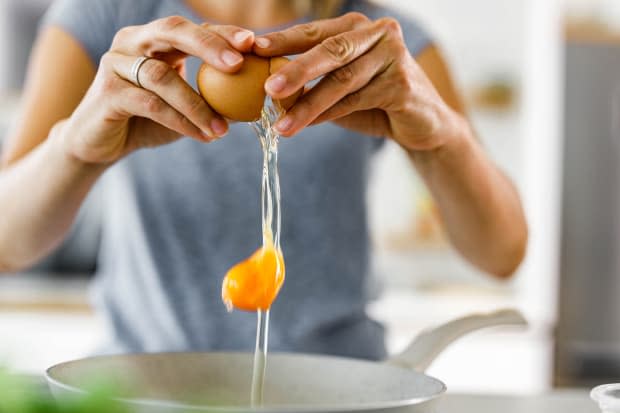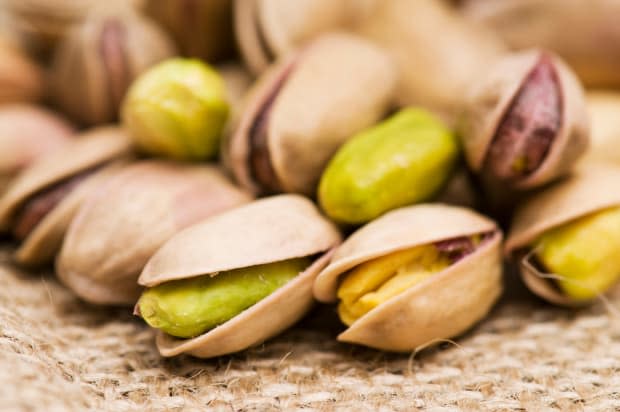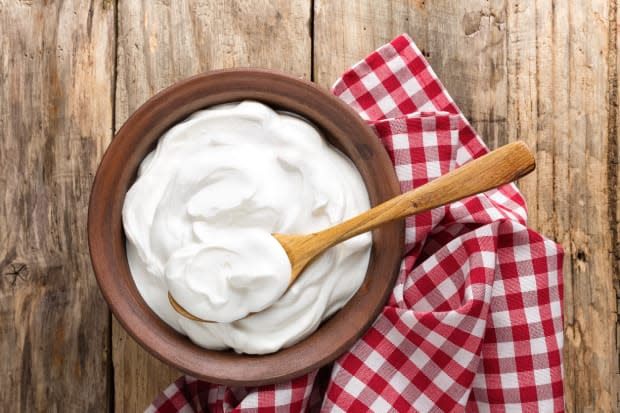Not Into Eggs? These 10 Foods Pack More Protein
You'd be hard-pressed to find a nutritionist who doesn't recommends eggs for protein—but these foods have more grams per serving.

iStock
Parade.com has an extensive editorial partnership with Cleveland Clinic, consistently named as one of the nation's best hospitals in U.S. News & World Report's annual "America's Best Hospitals" survey. Click here to learn more about our health reporting policies.
When it comes to weight loss, protein reigns supreme. Whether you're on a high-protein diet like the Atkins Diet or your eating plan requires you to get a certain amount of protein per day, it's a super important nutrient that will help you achieve your weight loss goals.
And when we think of protein, eggs are one of the first foods to come to mind. But did you know there are a wide variety of foods that actually have more protein than an egg?
But first, let's dive into why adequate protein is so crucial to weight loss. "It keeps you fuller longer and helps stabilize blood sugar," says Cory Ruth, MS, RDN, registered dietitian nutritionist, women's health expert, and CEO of The Women's Dietitian.
Besides that, it's also essential for your muscles.
"Protein is a vital nutrient that helps to promote growth, repair and rebuild muscle and damaged cells and body tissues, and also supports in other metabolic activities in the body," says Alexandra Oppenheimer Delvito, MS, RD, CDN, registered dietitian and Vice President of Pollock Communications.
She adds that most Americans get enough protein in their diets, and on average need about 0.8 g of protein per kilogram of body weight. How do you figure that out? Take your body weight in pounds, divide by 2.2 and then multiply by 0.8—this tells you how many grams of protein you should be eating per day.
Related: 50 Healthy High Protein Recipes
"Coupled with physical activity and a healthful, balanced diet, the addition of adequate protein could help you maintain lean muscle and a healthy weight," says Oppenheimer Delvito. So, which foods should you be eating to make sure you're getting enough protein? First, let's look at the nutritional breakdown of eggs—and then look at other foods you can eat instead.
How Much Protein Is In An Egg?
According to the U.S. Department of Agriculture, the amount of protein depends on the size of the egg. Here is how much protein is in a medium, large and jumbo egg:
One medium egg: 5.44 grams
One large egg: 6.3 grams
One jumbo egg: 7.94 grams
Related: 11 Easy & Delicious Ways To Eat More Protein
Foods With More Protein Than An Egg
But if you're trying to eat more protein, you're probably looking for multiple sources of protein. (Plus, not everyone is a fan of eggs.) Thankfully, there are a surprising number of protein-packed foods that have more protein than an egg per serving. Here are 10 of the best, according to dietitians.
1. Shrimp
Grams of protein per serving: 27g in 4 oz.
"Shrimp is also high in iron, zinc, and selenium," says Ruth.
2. Lentils
Grams of protein per serving: 18g in 1 cup
"Lentils are an excellent source of plant protein and contain beneficial dietary fiber, which can help you feel fuller longer, B vitamins and key minerals," says Oppenheimer Delvito. "Research has shown that including pulses, like lentils, in your diet may help support weight loss."
Adds Ruth, "Most plant-based proteins, like lentils, also contain some impressive fiber scores. There are also about 15 grams of gut-scrubbing fiber inside just one cup!"
3. Pistachios
Grams of protein per serving: 6 g per 1 oz. serving
"Pistachios are a complete plant protein containing all 9 essential amino acids," says Oppenheimer Delvito. "As a compact food that travels well, pistachios are easy to enjoy as a snack throughout the day providing fiber, protein and healthy fats that can help manage hunger levels."

iStock
4. Edamame
Grams of protein per serving: 8g in 1 cup
"Edamame is considered a 'complete plant-based protein' because it contains all nine essential amino acids," says Ruth.
5. Oatmeal
Grams of protein per serving: 5 g per ? cup dry oats
"We often think of grains for their carbohydrate content, but whole grains, like oats are also a noteworthy source of protein as well as fiber, vitamins and minerals," says Oppenheimer Delvito. "Studies have also found that including 3 grams of soluble fiber from oatmeal as part of a healthful diet may support with weight management. Oats also contain the soluble fiber beta-glucan which may promote feelings of fullness."
Related: 40 Best Plant-Based Protein Sources
6. Greek yogurt
Grams of protein per serving: 14g in 1 cup
"Greek yogurt is a great source of protein," says Ruth. "It’s delicious with berries and chia as a snack or for breakfast, as well as a stellar substitute for sour cream on tacos!"

iStock
7. Protein powder
Grams of protein per serving: 21g per serving
"Protein shakes are an easy-to-prepare source of protein that can help you feel satisfied as you work toward your wellness goals," says Oppenheimer Delvito. (She likes Orgain Plant-Based Protein Powder.)
8. Salmon
Grams of protein per serving: 23g in 4 oz
"Not only is salmon delicious when baked with a little lemon and dill, but it’s also super high in anti-inflammatory omega-3 fatty acids," says Ruth.
9. Chickpea pasta
Grams of protein per serving: 11g per 2 oz. dry serving
"Making the most of the protein and fiber-filled pulses, chickpea pastas (she likes Banza), are a tasty and satisfying way to up your protein intake," says Oppenheimer Delvito. "With more protein and fiber than traditional pastas, chickpea pasta is a great option for a meal that will keep you full."
10. Green peas
Grams of protein per serving: 8g in 1 cup
"Peas are a great source of plant-based protein," says Ruth. "They’re also full of fiber, vitamin C, and iron."
Next up: 15 Best Workouts for Weight Loss, According to Trainers
Sources
Cory Ruth, MS, RDN, registered dietitian nutritionist, women's health expert, and CEO of The Women's Dietitian
Alexandra Oppenheimer Delvito, MS, RD, CDN, registered dietitian and Vice President of Pollock Communications
View the original article to see embedded media.